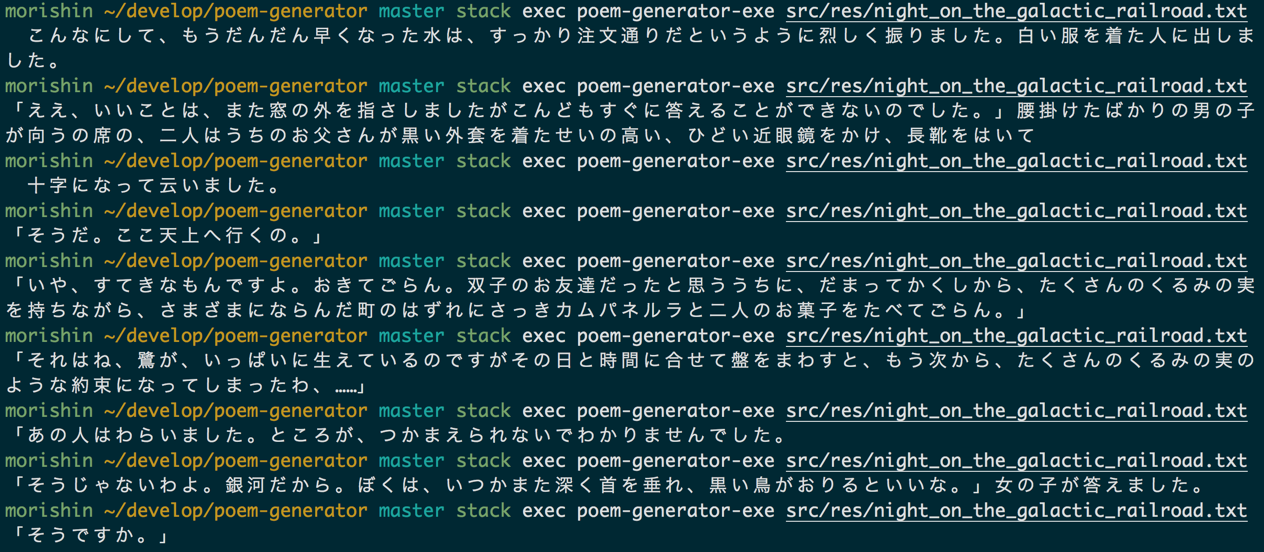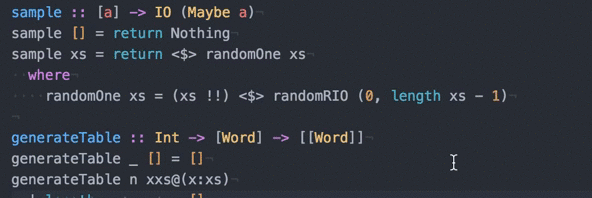
poem-generator#
I wrote a program to automatically generate poems for studying Haskell.
Since this is my first Haskell program, I think the code is a bit rough, but I would like to write an article about how I implemented it.
Here is the repository.
Implementation#
(The full source code is pasted at the bottom of the article)
This is the definition of the main function. It takes the source text as an argument and returns a generated poem by nicely connecting the words within it.
generatePoem :: String -> IO String
generatePoem source = do
mecab <- new ["mecab", "-l0"]
nodeLines <- mapM (parseToNodes mecab) (lines source)
let wordLines = map (filter (not . null) . map nodeSurface) nodeLines
let allWords = intercalate ["\n"] wordLines
let table = generateTable 3 (toWords allWords)
begin <- initialWords table
case begin of
Nothing -> return ""
Just ws -> chainWords table (tail ws) $ fromWords ws
First, the text received as an argument is split into a list of words wordLines for each line. For the splitting, I used the Haskell binding of the morphological analysis tool MeCab, specifically tanakh/hsmecab (I used a fork because there were some outdated parts).
If the source text consists of these three lines:
It seems that the cyark has been defeated...
Hehe... he is the weakest among the four heavenly kings...
To lose to mere humans is a disgrace to the demon race...
The lines are split into words like this:
["サイ", "アーク", "が", "やら", "れ", "た", "よう", "だ", "な", "..."]
["フフフ", "...", "奴", "は", "四天王", "の", "中", "でも", "最", "弱", "..."]
["人間", "ごとき", "に", "負ける", "と", "は", "魔", "族", "の", "面汚し", "よ", "..."]
Then, I intercalate them with the newline string "\n" to combine them. This corresponds to allWords in the code.
["サイ", "アーク", "が", "やら", "れ", "た", "よう", "だ", "な", "...", "\n", "フフフ", "...", "奴", "は", "四天王", "の", "中", "でも", "最", "弱", "...", "\n", "人間", "ごとき", "に", "負ける", "と", "は", "魔", "族", "の", "面汚し", "よ", "..."]
I wanted to add information about where the "beginning" and "end" of sentences are in this list of String, so I defined a new type:
data Word = Begin | Middle String | End
This converts the [String] into the following [Word]:
[Begin, Middle "サイ", Middle "アーク", ... , Middle "な", Middle "...", End, Begin, Middle "フフフ", ... , End]
Using generateTable 3, I create a table by cutting it into groups of three words.
| 1 | 2 | 3 |
|---|---|---|
| (Beginning) | サイ | アーク |
| サイ | アーク | が |
| アーク | が | やら |
| が | やら | れ |
| ⋮ | ⋮ | ⋮ |
| だ | な | ... |
| な | ... | (End) |
| (Beginning) | フフフ | ... |
| フフフ | ... | 奴 |
| ⋮ | ⋮ | ⋮ |
| よ | ... | (End) |
Now we are ready. By repeatedly selecting rows from this table and connecting them, we can generate sentences.
Rows are selected based on the following rules:
- The first selectable rows must start with (Beginning).
- The prefix (the first two words) must match the suffix (the last two words) of the previously selected row.
In this example, the first selectable rows are:
[Begin, Middle "サイ", Middle "アーク"]
[Begin, Middle "フフフ", Middle "..."]
[Begin, Middle "人間", Middle "ごとき"]
One of these is randomly selected.
The initialWords in the code handles this operation.
If [Begin, Middle "サイ", Middle "アーク"] is selected, the next selectable rows will start with [Middle "サイ", Middle "アーク"].
In this case, there is only the row [Middle "サイ", Middle "アーク", Middle "が"], but if there are multiple candidates, one will be randomly chosen from them.
By randomly selecting candidates like this and connecting them, the process ends when we reach a row that ends with End or when there are no more candidates.
The chainWords in the code handles this operation, recursively selecting candidates and connecting them, returning the generated text as IO String.
The reason it is IO String instead of String is that there is an operation that randomly selects candidates, and the return value changes each time the function is called.
In the example of the three lines of text, it is too short to produce multiple candidates, resulting in no randomness in the output. However, if the source text is something sufficiently long like a full novel, a variety of poems will emerge each time it is executed.
The image at the beginning of the article shows text generated using Kenji Miyazawa's "Night on the Galactic Railroad" as the source. In another example, using Osamu Dazai's "Run, Melos!" as the source produced the following text.

Markov Chains#
A probability process where the next state depends on the history of the past N states, including the current state, is called an Nth-order Markov chain (or N-fold Markov chain, Nth Markov chain). -- Wikipedia
The implementation above selects the next word based on the previous two words, so it would be a second-order Markov chain, I guess. I don't really know.
Thoughts#
- I had no idea about the syntax, so I was constantly referring to the Amazing Haskell Book while writing.
- I didn't really understand monads when I saw them in the book, but after writing, I got a bit of an understanding.
- The Atom plugins were great (language-haskell + ide-haskell + haskell-ghc-mod + autocomplete-haskell)

- Thanks to @ryota-ka and @lotz84 for teaching me various things when I didn't understand.
- Thanks to @tanakah for creating the MeCab binding. 🙏
